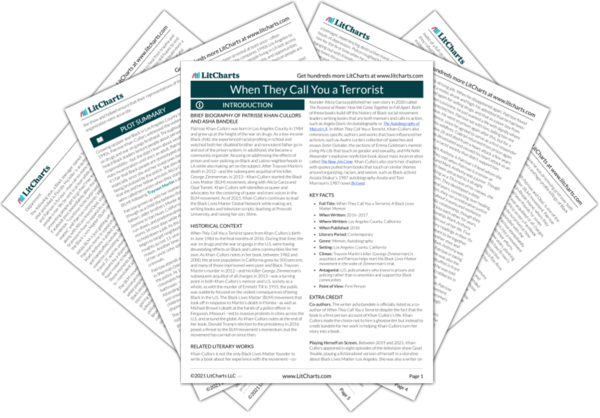Black Lives Matter
When They Call You a Terrorist is the memoir of Patrisse Khan-Cullors, one of the three founders of the Black Lives Matter (BLM) movement. As a “Black Lives Matter memoir,” the book focuses heavily on Patrisse’s work with BLM, as well as the adverse early life experiences she went through as a Black girl growing up poor in Los Angeles during the war on drugs and the war on gangs. This was a…
read analysis of Black Lives MatterPrisons and Policing
Much of When They Call You a Terrorist focuses on author Patrisse Khan-Cullors’s experience growing up poor and Black in Los Angeles in the 1990s, during the height of the U.S.’s war on drugs and war on gangs. During this time, policymakers tried to reduce drug use and gang violence by incarcerating low-income Black and Latinx people for minor infractions. As a child, Patrisse watched both her father and brother repeatedly be imprisoned…
read analysis of Prisons and PolicingIntersectionality of Identity
As a “Black Lives Matter memoir,” much of When They Call You a Terrorist focuses on race. Still, Patrisse makes it clear throughout her memoir that she is not just Black—she also self-identifies as a queer (non-heterosexual) woman, and she experiences homophobia and sexism both within and outside of her own community. This idea that various aspects of one’s identity—race, class, gender, sexual orientation, and so on—are interconnected and affect how one is treated…
read analysis of Intersectionality of Identity
Family, Community, and Healing
When They Call You a Terrorist makes the case that Black people are treated as disposable in the U.S.—by policymakers, police officers, and their fellow citizens. Patrisse has witnessed this in how police officers and the prison system have treated her brother Monte and father, Gabriel, as well as in high-profile killings of Black people. But despite broader society teaching Black people that their lives do not matter, Patrisse, her family (both blood family…
read analysis of Family, Community, and HealingExternal Forces vs. Personal Responsibility
Throughout When They Call You a Terrorist, Patrisse notices that many Black people in her life have gotten blamed for the hard choices they’ve made—the external factors that led them to that choice are rarely taken into account. For example, her stepfather, Alton, was an inconsistent presence in her life, but only after he was laid off from the stable job he had for 20 years and was unable to find another one…
read analysis of External Forces vs. Personal Responsibility






